Ten reasons why UNESCO should cancel the UNESCO-Obiang Prize
This week the Executive Board of the United Nations Educational, Scientific, and Cultural Organization (UNESCO) is meeting in Paris and is again considering the implementation of a highly controversial international prize that would lend credibility to one of the world’s most ruthless leaders. The controversy began in 2008, when UNESCO quietly accepted $3 million from Equatorial Guinea’s president, Teodoro Obiang Nguema Mbasogo, to be used for an endowed award in his name. The proposed UNESCO-Obiang Nguema Mbasogo International Prize for Research in the Life Sciences would reward scientific research activities “leading to improving the quality of human life.”[1]
The painful irony—and the impetus for what became a vigorous and high-profile global campaign to cancel the prize—is that, in his tenure as Africa’s longest ruling president (32 years), Obiang has demonstrated a systematic disregard for the quality of life of his country’s nearly 700,000 inhabitants. Equatorial Guinea has the highest per-capita income in Africa, on par with the United Kingdom and Germany thanks to its oil reserves, yet it spends less on improving the lives of its people than many other African countries, even those that possess fewer natural resources. Meanwhile, Obiang and his family abscond with the country’s wealth.
I traveled to Equatorial Guinea in 2004, where I witnessed the effects of this corruption:an aching inequality that etches the contours of a person’s life from before s/he is even born until the moment s/he leaves it. In subsequent years I have spoken with dozens of Equatoguineans about their struggles to meet their families’ most basic needs, beginning with clean water, shelter, health care, and education for their children.
At the heart of UNESCO’s mission stands the eradication of poverty, and Africa and education are two of the organization’s central priorities. Any decision other than the all-out extinction of the UNESCO-Obiang prize would be a blow to UNESCO’s credibility and an injustice to all who seek a better, more equitable quality of life for humankind.
Taken during my time in Equatorial Guinea, the photos below offer ten vivid reasons why members of UNESCO’s Executive Board must find the courage and resolve necessary to definitively cancel the UNESCO-Obiang prize.
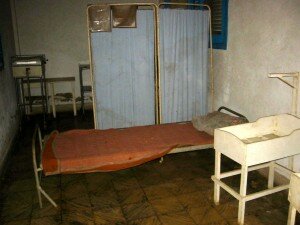 ONE. I visited a hospital in Basakato, just 26 kilometers (16 miles) from the capital city of Malabo, where babies take their first breaths of life on an unsanitary bed frame with no mattress. I was told new beds and bassinets had been donated by an international relief agency, but the mattresses were soon confiscated by soldiers for use at a nearby military base.
ONE. I visited a hospital in Basakato, just 26 kilometers (16 miles) from the capital city of Malabo, where babies take their first breaths of life on an unsanitary bed frame with no mattress. I was told new beds and bassinets had been donated by an international relief agency, but the mattresses were soon confiscated by soldiers for use at a nearby military base.
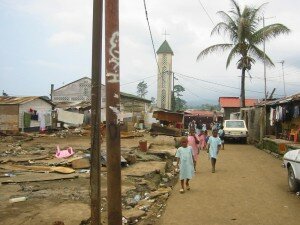 TWO. Some of the lowest health and education levels in the world are found in Equatorial Guinea. The Open Society Justice Initiative reports that, according to the UNDP’s 2009 Human Development Report, “Equatorial Guinea was the worst governed country of all surveyed, as measured by the disconnect between available wealth and development.”[2] Above, children walk home from school through the slums of the country’s capital, Malabo.
TWO. Some of the lowest health and education levels in the world are found in Equatorial Guinea. The Open Society Justice Initiative reports that, according to the UNDP’s 2009 Human Development Report, “Equatorial Guinea was the worst governed country of all surveyed, as measured by the disconnect between available wealth and development.”[2] Above, children walk home from school through the slums of the country’s capital, Malabo.
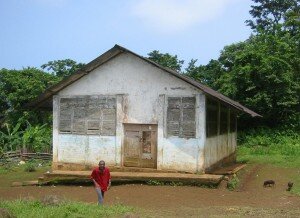 THREE. Despite its oil wealth, Equatorial Guinea spends less on education as a percentage of GDP than its neighbors. In 2008, the government spent roughly $200 million on education, while spending more than $800 million on a luxury complex to host the one-week African Union Summit in June 2011. Most rural children attend primary school in a one-room school house such as this one in Basuala Mision, 25 km (15 miles) from the capital.
THREE. Despite its oil wealth, Equatorial Guinea spends less on education as a percentage of GDP than its neighbors. In 2008, the government spent roughly $200 million on education, while spending more than $800 million on a luxury complex to host the one-week African Union Summit in June 2011. Most rural children attend primary school in a one-room school house such as this one in Basuala Mision, 25 km (15 miles) from the capital.
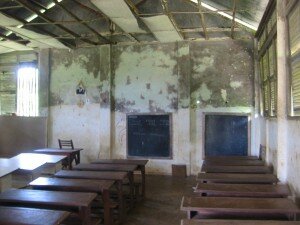 FOUR. This photo shows the interior of the Basuala Mision schoolhouse. Each row of desks represents a different grade in school, and one teacher is responsible for teaching all children in the room. In this schoolhouse, two blackboards are the only teaching materials on hand.
FOUR. This photo shows the interior of the Basuala Mision schoolhouse. Each row of desks represents a different grade in school, and one teacher is responsible for teaching all children in the room. In this schoolhouse, two blackboards are the only teaching materials on hand.
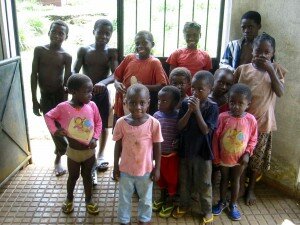 FIVE. Public school teachers in Equatorial Guinea are employees of the federal government and earn approximately CFA90,000 (US$150) per month. This is far from a livable wage in a country where the cost of living has skyrocketed in recent years. As a result, some rural schools sit empty or operate without trained instructors because teachers from the capital are reluctant to leave their families or move them to a rural area given the meager compensation they receive.
FIVE. Public school teachers in Equatorial Guinea are employees of the federal government and earn approximately CFA90,000 (US$150) per month. This is far from a livable wage in a country where the cost of living has skyrocketed in recent years. As a result, some rural schools sit empty or operate without trained instructors because teachers from the capital are reluctant to leave their families or move them to a rural area given the meager compensation they receive.
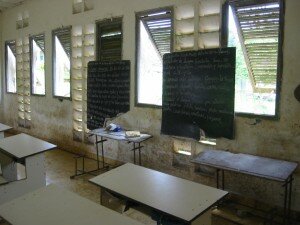 SIX. None of the schools I visited in Equatorial Guinea had electricity, running water, or working toilets. This one, in Cupapa, is well lit by sunlight, but others that maintain their wooden shutters closed to keep out heat, rain, and disease-carrying mosquitoes are too dimly lit to safely read. In one school in the capital that had a bathroom, it was so poorly maintained that it was unusable. Equatoguineans report this as a key reason children stop attending school. It is a particularly acute problem for girls as they reach menstruation.
SIX. None of the schools I visited in Equatorial Guinea had electricity, running water, or working toilets. This one, in Cupapa, is well lit by sunlight, but others that maintain their wooden shutters closed to keep out heat, rain, and disease-carrying mosquitoes are too dimly lit to safely read. In one school in the capital that had a bathroom, it was so poorly maintained that it was unusable. Equatoguineans report this as a key reason children stop attending school. It is a particularly acute problem for girls as they reach menstruation.
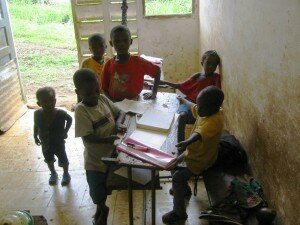 SEVEN. In Cupapa, 23 km (14 miles) from the capital, children receiving early primary education crowded around a desk to share materials. Outside, a handful of classmates played soccer by kicking around an empty can. Some were barefoot; others wore just one rubber sandal, which I learned the boys strategically placed on their kicking foot.
SEVEN. In Cupapa, 23 km (14 miles) from the capital, children receiving early primary education crowded around a desk to share materials. Outside, a handful of classmates played soccer by kicking around an empty can. Some were barefoot; others wore just one rubber sandal, which I learned the boys strategically placed on their kicking foot.
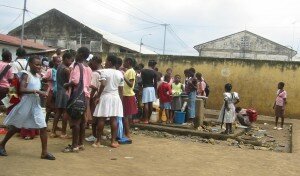 EIGHT. As noted above, the country’s oil revenues give it a per-capita income on par with many modern, industrialed nations. For most citizens, however, living standards remain low, with many still living in trash-filled slums without reliable electricity or drinking water. The children in this picture are lined up at a well in the capital city of Malabo to fetch water to take home to their families. In Equatorial Guinea the struggle to meet basic needs often gets in the way of a child’s education, and, indeed, of childhood itself.
EIGHT. As noted above, the country’s oil revenues give it a per-capita income on par with many modern, industrialed nations. For most citizens, however, living standards remain low, with many still living in trash-filled slums without reliable electricity or drinking water. The children in this picture are lined up at a well in the capital city of Malabo to fetch water to take home to their families. In Equatorial Guinea the struggle to meet basic needs often gets in the way of a child’s education, and, indeed, of childhood itself.
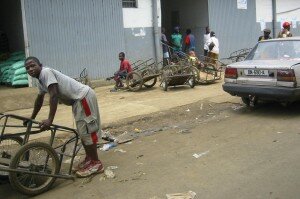 NINE. If rural families want their children to be educated beyond primary school, they typically have to send them to Malabo. In the city, adolescents live with extended family or even strangers and often work odd jobs, like these boys outside the Suguisa market, to fund their education. Public education in Equatorial Guinea includes many hidden costs, as students are required to pay for their annual registration fees, uniforms, report cards, and school identification cards. Oddly, books and materials are not always required, and when they are, they are often not readily available or affordable.
NINE. If rural families want their children to be educated beyond primary school, they typically have to send them to Malabo. In the city, adolescents live with extended family or even strangers and often work odd jobs, like these boys outside the Suguisa market, to fund their education. Public education in Equatorial Guinea includes many hidden costs, as students are required to pay for their annual registration fees, uniforms, report cards, and school identification cards. Oddly, books and materials are not always required, and when they are, they are often not readily available or affordable.
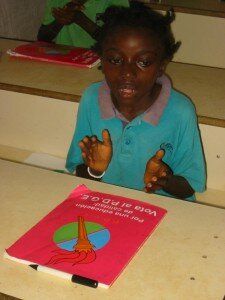 TEN. When I visited the primary school in Bariobe, approximately 35 km (22 miles) from Malabo, the children gave a stirring performance, which included singing and clapping for their guests. I noticed that each had a hot pink notebook on his or her desk. Emblazoned on the front of each notebook was the emblem of President Obiang’s political party, the Democratic Party of Equatorial Guinea (P.D.G.E.). Accompanying the insignia read the words, “For a quality education: Vote for the P.D.G.E.”
TEN. When I visited the primary school in Bariobe, approximately 35 km (22 miles) from Malabo, the children gave a stirring performance, which included singing and clapping for their guests. I noticed that each had a hot pink notebook on his or her desk. Emblazoned on the front of each notebook was the emblem of President Obiang’s political party, the Democratic Party of Equatorial Guinea (P.D.G.E.). Accompanying the insignia read the words, “For a quality education: Vote for the P.D.G.E.”
As an educator and social scientist myself, I dream of making an impact large enough to merit an award from an organization such as UNESCO, not for the sake of glory, but because I am driven by a global vision of social justice. It is clear, however, that the UNESCO-Obiang prize is a hollow attempt by a self-aggrandizing leader to improve his international reputation while his people continue to suffer. UNESCO’s Executive Board should honor its mission and preserve it integrity by rejecting the UNESCO-Obiang prize. It should urge President Obiang to instead invest that money in his own people, empowering them to build a future that shines brightly for all.
YOU CAN HELP! TAKE ACTION NOW by visiting EG Justice or by sending an email to [email protected] (Irina Bokova, Director General of UNESCO), imploring UNESCO to cancel the Obiang Nguema International Prize for Research in the Life Sciences.
Angela Stuesse is Assistant Professor of Anthropology at the University of South Florida. She visited Equatorial Guinea in 2004 and conducts politically engaged research on issues of neoliberal globalization, race, migration, organizing and social justice.


COMMENTS